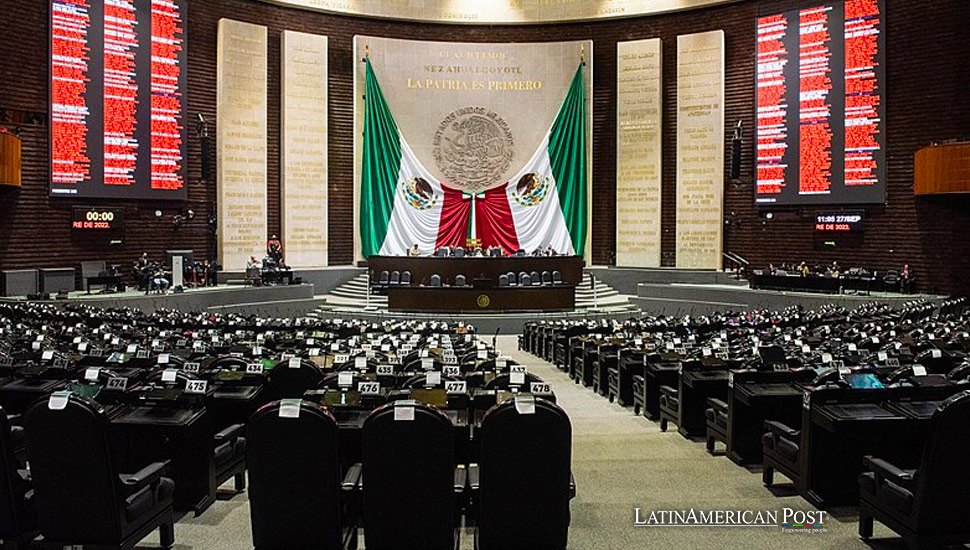Mexico’s Ruling Party Secures Lower House Super-Majority, Misses Senate Threshold

Mexico’s ruling Morena party and its allies secured a supermajority in the lower house. Still, they fell short in the Senate, raising questions about the future of constitutional reforms under President-elect Claudia Sheinbaum.
In a historic election on June 2, Mexico’s ruling Morena party, led by Claudia Sheinbaum, secured a commanding victory in the lower house of Congress but fell just shy of a supermajority in the Senate. This election marks a significant moment in Mexico’s political history as Sheinbaum becomes the country’s first woman president. However, the election results also set the stage for a potentially tumultuous period as Morena and its allies, emboldened by their electoral success, pursue ambitious reforms, sparking intrigue and engagement among the populace.
The preliminary results showed a landslide victory for Sheinbaum and her party. In coalition with the Green Party and the Labor Party, Morena will control 83 seats in the 128-seat Senate, just short of the 85-seat supermajority threshold needed to change the constitution. In the 500-member lower house of Congress, the coalition secured 372 seats, surpassing the 334-seat supermajority threshold.
Morena President Mario Delgado expressed optimism about the results, stating, “With a supermajority in the lower house and a majority in the Senate, we will deepen the transformation to keep building a country with well-being and shared prosperity.” This majority in the lower house gives Morena significant legislative power, but the lack of a supermajority in the Senate poses challenges to their planned constitutional reforms.
Political Shifts in Mexico
The recent election is part of a broader trend of political shifts in Latin America. Historically, Mexico’s political landscape has been dominated by the Institutional Revolutionary Party (PRI), which ruled for over 70 years until the early 2000s. The emergence of Morena, founded by outgoing President Andrés Manuel López Obrador (AMLO), represents a significant shift toward leftist politics.
AMLO’s presidency has been marked by efforts to centralize power and implement wide-ranging reforms. His administration has focused on combating corruption, reducing inequality, and increasing government intervention in various sectors. However, these efforts have also faced criticism for undermining democratic institutions and checks and balances.
The Rise of Claudia Sheinbaum
The election of Claudia Sheinbaum as Mexico’s first woman president is a momentous event in the country’s political history. A scientist and former mayor of Mexico City, Sheinbaum’s pragmatic approach and strong leadership have earned her widespread respect. Her victory not only reflects the electorate’s desire for continuity in the policies initiated by AMLO but also signals a significant shift in the gender dynamics of Mexican politics.
Sheinbaum’s presidency is expected to build on AMLO’s legacy while addressing the challenges of corruption, inequality, and economic instability. Her administration will likely focus on social programs, infrastructure development, and environmental sustainability. However, the success of her agenda will depend on her ability to navigate the complex political landscape and work with the divided Congress.
One of the critical issues facing the new administration is the pursuit of constitutional reforms, a topic that has sparked significant controversy and debate. These reforms, which include eliminating independent energy regulators, consolidating power within the executive branch, and overhauling the judiciary to introduce popularly elected Supreme Court judges, are not without their challenges. The potential implications of these changes on democratic institutions and the balance of power have raised concerns, making it crucial for the audience to be aware of the ongoing discussions.
Critics argue that these reforms could undermine democratic institutions and concentrate too much power in the hands of the executive. The opposition, led by Xochitl Galvez, has raised concerns about the potential erosion of checks and balances and the impact on judicial independence. Galvez, who lost to Sheinbaum by approximately 30 percentage points, has called for a recount of 80% of the ballot boxes, highlighting the tensions and uncertainties surrounding the election results.
Economic and Market Reactions
Uncertainty over the composition of the next Congress and potential constitutional reforms has roiled markets. Investors are wary of the implications of these reforms on the business environment and economic stability. Eliminating independent regulators and centralizing power could deter investment and impact sectors such as energy and finance.
AMLO and President-elect Sheinbaum have signaled their support for these sweeping reforms, emphasizing the need for greater government control and oversight. However, balancing these reforms with maintaining investor confidence and economic growth will be a significant challenge for the new administration.
The developments in Mexico are part of a broader wave of political changes across Latin America. The region has seen a resurgence of leftist governments, reflecting public discontent with inequality, corruption, and neoliberal policies. Countries such as Argentina, Chile, and Bolivia have also experienced shifts towards left-leaning administrations, each grappling with similar issues of economic reform and social justice.
These political changes are often accompanied by significant challenges, including managing economic stability, addressing social inequalities, and ensuring democratic governance. The experience of these countries offers valuable lessons for Mexico as it navigates its own political and economic landscape.
The Road Ahead
As Claudia Sheinbaum prepares to take office, her administration faces a complex and divided political environment. The supermajority in the lower house provides a strong mandate, but the need for a supermajority in the Senate requires careful negotiation and coalition-building. Sheinbaum’s ability to implement her agenda will depend on her ability to manage these political dynamics and address the concerns of the opposition and civil society.
The success of the proposed constitutional reforms will be a crucial test for Sheinbaum’s presidency. These reforms, if implemented, could potentially reshape Mexico’s political and judicial landscape. However, they also carry significant risks, particularly in terms of their potential impact on democratic institutions. Ensuring that these changes strengthen rather than undermine these institutions will be a key challenge for Sheinbaum’s administration.
The recent election results have set the stage for a new era in Mexico’s political history, with Morena and its allies securing a decisive victory in the lower house of Congress. However, the road ahead is not without its challenges. As President-elect Claudia Sheinbaum prepares to take office, she must navigate a divided Senate, implement ambitious reforms, and address the pressing issues of economic stability and social justice. The success of her administration will depend on how effectively these challenges are met.
Also read: Women Demand Action Against Child Custody Abuse in Mexico’s Jalisco
The future of Mexico’s democracy and governance depends on how effectively these challenges are met. By balancing the need for reform with the principles of democratic governance, Sheinbaum’s administration has the opportunity to build a more inclusive and prosperous future for Mexico. The eyes of the nation and the international community will be watching closely as this new chapter in Mexican politics unfolds.





